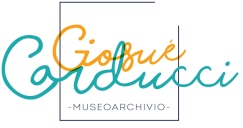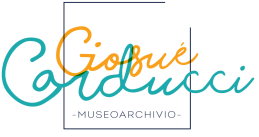The first of three brothers, Giosuè Carducci was born in Valdicastello, a hamlet of Pietrasanta in Lucca’s Versilia region, on July 27, 1835, to physician Michele Carducci and Ildegonda Celli.
Father, Michele Carducci was a man of restless, irascible character and radical political ideas: he was a medical student in Pisa and in 1830-31 became a supporter of the revolution then taking place in France.
For this choice he was sentenced first to prison and then to confinement in Volterra, Maremma, far from the more effervescent cultural life of northern Tuscany. When his year of confinement ended, Michael returned to Pisa where he graduated and married Ildelonga Celli, daughter of a disgraced Florentine goldsmith.
The two later moved to their new home in Val di Castello and also brought with them Lucia Galleni, Joshua’s grandmother, who had been widowed and penniless due to her husband’s gambling addiction and infidelity.
After the bankruptcy of the mining company for which Michele worked, the Carducci family fell into disgrace and in 1836 moved to Serravezza where the spread of Cholera made the presence of experienced doctors necessary.
In 1838 Michele Carducci obtained the position of Medico Condotto at Bolgheri, in Maremma, then the fiefdom of the Conti della Gherardesca, who retained possession of numerous properties and sharecropping contracts in the lands worked by the peasants of the local population.
After two centuries in Versilia, the Carducci family moved to the Maremma, to Bolgheri. Little Joshua was only three years old, but they were enough to bind him strongly to this territory, thanks mainly to the stories of his beloved grandmother Lucia. The Maremma remained so imprinted in little Joshua’s soul as an enchanted and wild place that it became a constant in his poetics.
A wandering and bright youth that of Carducci, who roamed far and wide between the small Tuscan village and the surrounding countryside, growing up amid early reading, adventures in the countryside and friendships with sons of butteri and farmers. The chronicles of the time describe little Joshua as a lively, active and even wild child; in fact, it seems that he even befriended a tame wolf cub and a falcon, with whom he roamed the countryside all over Bolgheri for an entire summer.
Meanwhile, his parents were trying hard to impart a classical education to Joshua: his father initiated him in the Latin reading of Phaedrus while his mother used to read Alfieri and Berchet’s poems to him.
Needless to say, the restless Joshua did not relent; on the contrary, his father’s irate demonstrations that forced him to days of confinement in the house in which he had to read texts such as Alessandro Manzoni’s “La Morale Cattolica” or Silvio Pellico’s “The Duties of Man,” pushed him even more to roam the countryside and seek contact with nature and animals.
Such was young Joshua’s hot temper that, eventually, gripped by despair, father entrusted him to mason Giuseppe Salvadori, better known as “Bombo,” telling him: <<Listen Bumblebee I thought to see at least if it can be tamed, to entrust the baby to you. Work him full back, and if you can straighten him out, I promise you a nice gift.>> After a few days, Bombo quickly realized that Joshua aka “Tortolo” was not suitable to be a laborer since he spent most of his time spouting “peppery” poetry, so he decided to return him to the sender.
Amid intemperance and formative attempts gone awry, Carducci carried on his literary thirst. At 8 years old, he was diving into reading contemporary poems such as Gabriele Rossetti’s The Lonely Seer while branding Petrarch’s The Canzoniere, which he immediately branded as “A little book of arithmetic.”
His hunger for books was such that he apparently read Dante Alighieri’s entire Inferno in a single day.
It is from here that he begins to write the very first verses in his own hand. Once again telling us about him is testimony always the mason “Bumblebee” who states: <<Once, for the feast of the Most Holy Crucifix he wrote a sonnet so well that it was remembered for a while by everyone. I knew it in my head, but now after so many years it has passed me by: but I can tell you that it was epoch-making then>>.
According to Saponaro, the earliest lyrics were octaves in death of the owl possessed by a friend, in imitation of the lyrics of Catullus, an author who by then was able to read fluently thanks to the teachings imparted by his father. This was followed by Joshua writing a series of satirical tercets about the late Queen Marie Antoinette, a favorite target for the young man who harbored revolutionary fantasies, and a short story composed in octaves entitled The Taking of the Castle of Bolgheri, and the first sonnet with the surprising title of To God.
Between the readings and early youthful compositions, Carducci missed the chance to fall in love. It is precisely to this period that the infatuation with the famous “Blonde Mary,” which for years biographers and historians have tried to trace back to a specific person, is traced. Once again comes valuable testimony from Bombo:
<< […] I can assure you that in the matter of ladies he stood behind no one. He had blondes, brunettes and chestnuts, what the hell!
How funny those who want to look in Bolgheri for mi’ Tortolo’s “Blonde Mary” make me laugh! And they do not understand that Joshua said Maria, as he would have said Carola, Catera or Vincenzina: and blonde, as he would have said brunette, redhead and chestnut; for at his age one cannot be taken seriously of any. As a matter of fact, in Bolgheri god Marys have died quite a few, a few of them are still alive, and all of them, or almost all of them, have wanted or want to be “the blonde Mary.” What does this tell you? That Tortolo was viscous and willingly shared his love.>>
For some, in short, the girl is nothing more than a rhetorical device representing Carducci’s infatuations with girls while for someone else the “Blonde Mary, apparently was a young girl already on her way to being a woman, two years older than Joshua:
truth remains a mystery destined, to this day, not to be revealed.
At the age of 10 Joshua became ill with Malaria, and his father in the spring of 1846 sent him to Castagneto in the hope that he would be cured by healthier air. Here, hosted by Bernieri the barber, Joshua devoted himself to his revolutionary and republican ideas. It seems that Bernieri took him with him on his hairdressing tours for Madame and that Giousè recited poems full of political ferment. This is also why he became friends with Alessandro Scalzini, who also held republican views. With friends they minted fake paper coins for fun and a divided the forest into provinces.
At the end of the fevers, also in 1846, Carducci was recalled to his father in Bolgheri. Where the trend was the same. But bigger facts would soon change the life of the Carducci family.
The uprisings of 1848 hit Europe like a predictable storm.
The Grand Duchy of Tuscany and the small fief-commune of Gherardesca were also affected by these movements. If the inhabitants of Bolgheri were historically more connected to the Count and the nobility of the time, those in Castagneto claimed extensive access to hunting and fishing, free use of water and land that was still subject to feudal administration by the Della Gherardesca family, and which the peasants cultivated by paying a kind of rent that was increasingly tight for them.
Joshua and his friends, now teenagers, symbolically participated in the protests: they erected a rough tree of liberty (in the style of those of the French Revolution), affixed the Della Gherardesca coat of arms at the top, and then set fire to it.
Castagneto became the center of protests and demands for land reform, and Dr. Michele Carducci did not hesitate to divide himself between his duties as a doctor and his dreams of revolution, and this did not escape those still loyal to the Count.
The protests of the population reached the ears of Grand Duke Leopold II, who
It yielded to the demands of property rights and use: on April 3, 1848, some 800 hectares of land were transferred in perpetuity to the inhabitants of the municipality of Gherardesca, which three days later resumed its former and current official name of Castagneto.
Father Michael, moved by high republican ideals, did not want the chestnut grove one to turn into a small land repossession and blew the revolution. His political action, however, led him to expose himself to such an extent that, on the night of May 22-23, 1848, the house in Bolgheri where the Carduccis lived was made the target of numerous shootings. The culprit was unknown, but the message was clearly perceived: the revolutionary doctor, in Mr. Count’s country, was no longer welcome.
So it was that the family moved near Castagneto, housed in a house belonging to the Espinassi-Moratti family.
At a later time Michael took his son Joshua, then 14 years old, and brought him
First to Pisa and then to Livorno to meet Francesco Domenico Guerrazzi Giuseppe Montanelli, a veteran of the battles of Curatone and Montanara. Sparked by the first fires of the Livorno insurrection against the Austrians Joshua met eminent figures of Italian and Tuscan radicalism and patriotism.
In 1849, during Guerrazzi’s brief and turbulent rule, Dr. Carducci, probably feeling surrounded by the overall unwillingness of the environment to share his radical ideas again, chose to leave Castagneto. Joshua and brothers Dante and Walfredo were now 14, 13 and 8 years old, respectively.
The family first repaired to the then-lost town of Lajatico, where Michele Carducci found work as a temporary doctor. But the stay here was short-lived. Chiarini reports that the doctor came to blows with the peasants and, coming out defeated, they forced him to kiss a bust of Leopold II. The family moved to Florence, where Joshua would begin high school.

